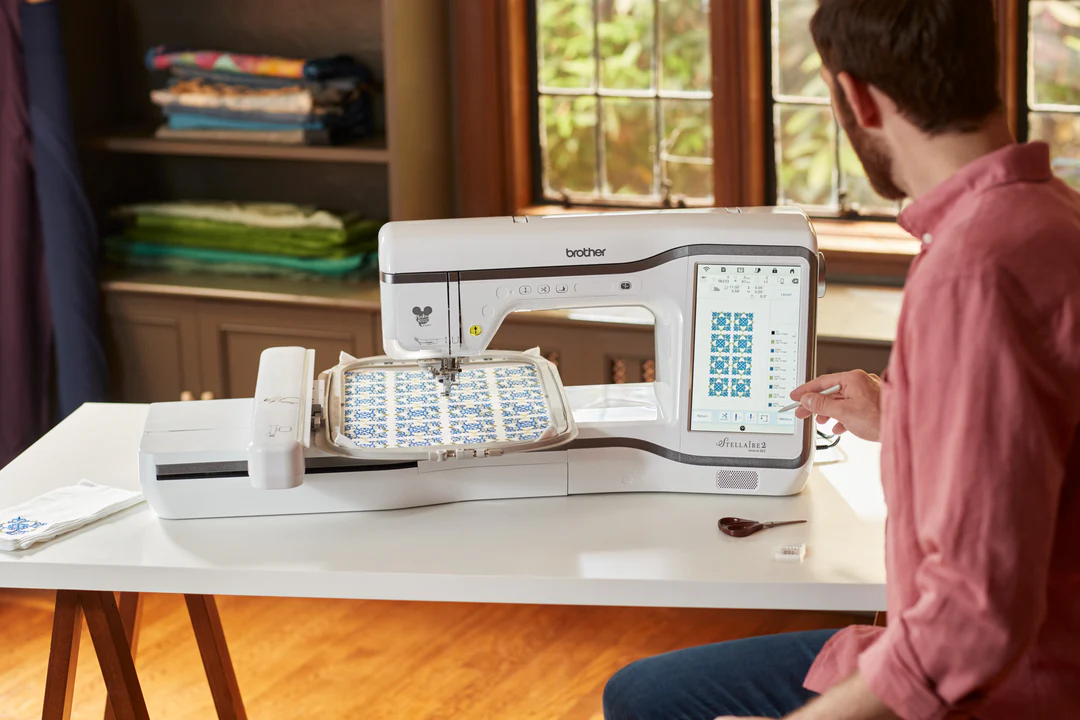fashion

April 03,2025 • 5 min read
DIY Embroidery Magic: Convert Images to JEF Like a Pro

Introduction
Imagine transforming your favorite photo into a heartfelt embroidered portrait, converting your business logo into a professional uniform patch, or turning your original artwork into a one-of-a-kind stitched masterpiece—all for your Janome embroidery machine. While convert image to JEF file (Janome's proprietary embroidery format) might seem intimidating at first, the truth is that with the right guidance, anyone can achieve stunning, professional-quality results from home.
The real challenge lies in bridging the gap between digital images and physical stitches. Unlike simple vector graphics that translate easily to embroidery, photographs and complex artwork contain subtle gradients, intricate details, and color variations that require careful preparation. Without proper conversion techniques, you might encounter:
❌ Blurry or pixelated designs where facial features or text become unrecognizable
❌ Unnecessary thread breaks from overly dense stitching or poor pathing
❌ Distorted shapes that lose the original image's proportions
❌ Color bleeding where delicate shading turns into a muddy mess
But don't let these potential pitfalls discourage you! In this comprehensive guide, we'll walk you through every step of the process:
-
The best free and paid software for JEF conversion (including surprising budget-friendly options that deliver pro results)
-
Step-by-step image preparation techniques used by professional digitizers
-
Janome-specific optimization tricks to ensure perfect machine compatibility
-
Pro troubleshooting tips for when things don't go as planned
-
Creative workarounds for handling challenging images like portraits
Whether you're looking to create personalized gifts, start a small embroidery business, or simply explore a new creative hobby, mastering JEF conversion will open up a world of possibilities. Let's begin your journey from digital images to beautiful embroidered reality!
Why Convert Image to JEF Files?
Janome embroidery machines use JEF as their native format because:
✔ Smaller file size than universal formats like DST
✔ Preserves precise stitch data for Janome’s special features
✔ Better hoop alignment and color accuracy
While you can use PES or DST files, JEF ensures optimal performance on Janome machines.
Best Software to Convert Images to JEF
1. Janome Digitizer MBX (Paid – Best for Janome Users)
-
Price: $800+
-
Pros: Perfect JEF compatibility, advanced editing
-
Cons: Expensive for hobbyists
2. Hatch Embroidery (Paid – Best Value)
-
Price: $99/month
-
Pros: Great auto-digitizing, includes JEF export
-
Cons: Subscription model
3. Embrilliance Essentials (Budget-Friendly)
-
Price: $200+
-
Pros: Easy to use, good for simple designs
-
Cons: Limited advanced features
4. Ink/Stitch (Free – For DIYers)
-
Price: Free (Inkscape plugin)
-
Pros: No cost, decent for basic designs
-
Cons: Steep learning curve
5. MyEditor (Online – Quick Fixes)
-
Price: Freemium
-
Pros: No software install needed
-
Cons: Watermarked files
Step-by-Step: Convert Image to JEF File
Step 1: Choose the Right Image
-
High contrast (e.g., black-and-white logos work better than photos)
-
Simple compositions (avoid crowded backgrounds)
-
300+ DPI resolution
Step 2: Simplify the Image
-
Open in Photoshop, GIMP, or Canva.
-
Convert to grayscale (Image > Adjustments > Black & White).
-
Boost contrast to define edges.
-
Reduce colors to 3-5 main shades.
Step 3: Digitize Using Software
(Using Hatch Embroidery as Example)
-
Import your edited image.
-
Click Auto-Digitize (adjust stitch type: fill/satin).
-
Manually clean up messy areas.
-
Reduce stitch count (aim for under 20,000 stitches).
-
Export as JEF.
Step 4: Test Stitch
-
Use scrap fabric similar to your final project.
-
Check for:
-
Puckering → Reduce density
-
Blurry details → Simplify design
-
Thread breaks → Adjust tension
-
Pro Tips for Flawless JEF Files
✔ Trace key outlines manually for sharper edges.
✔ Use fill stitches for large areas, satin for details.
✔ Limit to 6 thread colors max (Janome’s color display shows 6 at a time).
✔ Stitch dark-to-light to prevent shadowing.
Troubleshooting Common Issues
1. Janome Machine Doesn’t Recognize JEF File
-
Fix: Ensure the file extension is .jef (not .zip).
2. Design Stitches But Looks Pixelated
-
Fix: Start with a higher-resolution image (600+ DPI).
3. Thread Colors Don’t Match
-
Fix: Manually assign thread colors before exporting.
FAQ
Q: Can I convert JPG to JEF for free?
A: Yes! Ink/Stitch (with Inkscape) or MyEditor (online) offer free options.
Q: Why does my JEF file have gaps?
A: Increase stitch density or add underlay stitches.
Q: What’s the easiest software for beginners?
A: Hatch Embroidery (auto-digitizing + tutorials).
Final Verdict: Best Method?
| Janome Owners | Janome Digitizer MBX |
| Hobbyists | Hatch Embroidery |
| Budget Users | Embrilliance Essentials |
| Free Option | Ink/Stitch |
Conclusion
Converting images to JEF files unlocks endless creative possibilities for Janome embroidery machines, just as learning to convert JPG to PES opens doors for Brother machine users. Whether you use free tools like Ink/Stitch or invest in pro software like Hatch (which can handle both JPG to PES and JEF conversions), the key is testing and refining your designs through practice. Start with simple images, develop your digitizing skills, and soon you'll master both JPG to PES and JEF conversions like a pro. Remember: great embroidery comes from patience and persistence, not magic.
Tom Cruise Details
User Profile
- Full name
- Tom Cruise
- Email address
- yaxirkhan.sgi@gmail.com
- Join Date
- 2025-04-03
- State
- City
- Pincode
- Address
- Follow us on Facebook
- Follow us on Twitter
- Website Name
- Bio